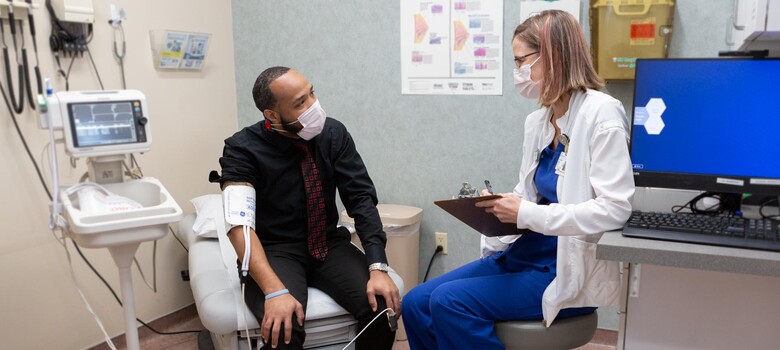 From the DukeHealth.org archives. Content may be out of date.
From the DukeHealth.org archives. Content may be out of date.
Colon Cancer Screening

With about 135,000 new cases diagnosed each year, colon cancer is the fourth most common cancer in the United States, just behind malignancies of the lung, breast, and prostate. The nation's second-leading cause of cancer deaths, it kills more than 55,000 Americans each year. Yet -- when caught early -- colon cancer is among the most treatable of all types of cancer.
Unlike many other cancers that can appear suddenly and grow quickly, colon cancer has a long precancerous phase as growths or polyps, which often exist for several years before becoming cancerous. If these growths are discovered and removed promptly, colon cancer can be prevented. Even after colon cancer has developed, it's 90 percent curable when found early.
Many people who are otherwise conscientious about their health seem to practice a "see-no-evil, hear-no-evil" approach when it comes to protecting themselves against colon cancer.
As a result, only a fraction of the people who could benefit from colon screening actually receive it. But the prevalence of this malignancy -- and the relative ease with which it can be diagnosed and treated in its early stages -- offer compelling reasons to get past the reticence.
New surgical techniques and drug therapies are improving outcomes, extending lives, and enhancing quality of life for colon cancer patients. But, as with any type of cancer, an ounce of prevention is worth the proverbial pound of cure.
To minimize your risk of developing full-blown colon cancer, follow these tips.
- Follow a healthy diet. More and more studies indicate a relationship between a diet rich in fruits and vegetables -- especially bright-colored vegetables, which are rich in beta carotene, and leafy greens -- and a lower risk of all types of cancer, including colon cancer. Fiber alone won't do the job; a range of healthful, nutritious, low-fat foods is your best bet.
- Get regular exercise. This recommendation, too, is becoming a touchstone for the prevention of many serious health conditions, including colon cancer. Recent studies show that regular moderate exercise can reduce the risk of developing colon cancer by almost 50 percent.
- Just say no -- or not much. Abundant research confirms that smoking may significantly increase your risk for not only lung cancer, but many other cancers, including colon cancer. As for alcohol consumption, while a small amount may be healthful to your heart, too much can also be a risk factor for colon cancer -- so, if you drink, do so in moderation.
- Get screened. The American Cancer Society recommends that people at average risk be screened for colon cancer starting at age 50. This is typically accomplished by a colonoscopy, which should be repeated every 10 years. Other screening tests include flexible sigmoidoscopy (which uses a flexible tube with a camera to visually examine the lower third of the colon) or a stool test. People at higher risk for colon cancer should begin screening earlier, and undergo it more frequently and generally should only be screened by colonoscopy.
- Know your risk factors. Risk factors for colon cancer include a family history of colon cancer or a personal history of other cancers or colon diseases. Should you have one or more of such risk factors, your doctor will probably suggest that you begin flexible sigmoidoscopy or colonoscopy screenings before the age of 50.
- Be alert for symptoms. Symptoms of colon cancer include blood in the stool, a change in bowel habits, and abdominal pain. The optimum approach, however, is not to wait for symptoms to appear (a sign that the cancer, if diagnosed, has been growing for some time) but to catch colon cancer before it becomes symptomatic.
While colon cancer is a serious disease, if it is found and treated early, the prognosis is excellent. So, to avoid regrets later, take steps to prevent colon cancer now.


